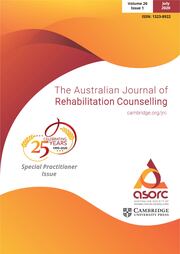Article contents
Long Term Unemployment and Rehabilitation Counselling: Problems Faced and Competencies Required
Published online by Cambridge University Press: 27 August 2015
Abstract
The impact of long-term unemployment is not confined to the vocational sphere but also includes a psychosocial component. Many who are out of work for long periods of time not only report deskilling but also lack of support, poor self esteem and low self confidence. This paper examines some of these issues by reference to both the Australian government's ‘Working Nation’ paper on unemployment and research carried out with 77 unemployed persons in Sydney, Australia. While it is not unusual for rehabilitation counsellors to receive referrals of people with disabilities who have been unemployed for considerable periods, contact with the general long-term unemployed population has been less common. The rehabilitation counselling profession is closely examined in terms of the degree to which its skill and knowledge base matches the needs profile of this general unemployed population. Rehabilitation counselling was found to be an appropriate profession to deal with the complex mix of vocational and psychosocial issues confronted by persons who have remained unemployed for long periods of time.
- Type
- Articles
- Information
- Copyright
- Copyright © Cambridge University Press 1995
References
REFERENCES
- 4
- Cited by




